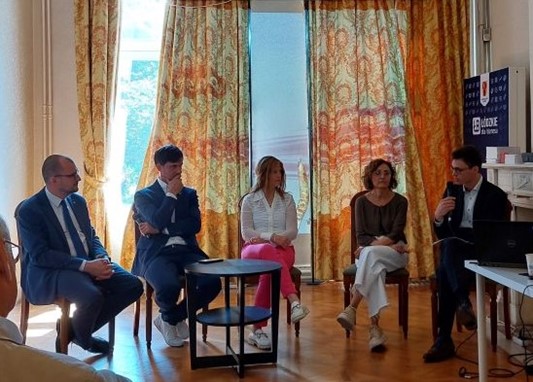On 6 June, EURADA organised an EU Green Week Partner Event entitled “Reskilling and informing citizens and supply chain actors on implementing circular solutions for territorial transformations”. The workshop featured the four European circular economy projects of the LOOP cluster, namely FRONTSH1P, Agro2Circular, EcoeFISHent, and CIRCULARFOAM, all funded under the same Horizon 2020 call.
The purpose of the workshop was to showcase and exchange the various training, knowledge transfer and stakeholder engagement activities undertaken by these four projects. The collaboration among the projects centres around developing and implementing circular systemic solutions across European regions. During the event, representatives from each project delivered insightful 10-minute presentations, highlighting their project's topic, main challenges, and activities developed.
First, Fabio Magrassi,Project Manager of FRONTSH1P, emphasised the mission and challenges faced in achieving a circular region, underlining the significance of citizen engagement. Stefania Truffa, from EcoeFISHent, shared the activities and programmes aimed at protecting marine ecosystems and establishing and replicating six interconnected multilevel and circular value chains. Sebastian Engell from ZEDO and TU Dortmund, along with Patryk Bialas from EURO-CENTRUM, presented CIRCULAR FOAM's concept of creating circular value chains from insulation materials sourced from refrigerators and construction waste with the aim of obtaining a recyclable material stream. Finally, Fuensanta Monzó Sánchez, Project Coordinator of Agro2Circular, a project where EURADA collaborates with its member INFO Murcia, highlighted the hidden value of agrifood sector residues and community engagement efforts.
Following the presentations, a dynamic Q&A and discussion session provided participants, both online and in person, the opportunity to delve deeper into the projects' progress and achievements. The conversation underscored the importance of incorporating public knowledge, involving technical producers and infrastructures, and fostering engagement to establish circular value chains across diverse domains.
The EU Green Week event served as a platform to generate interest in these four sister projects and emphasised the value of circularity in both our present and future through the multitude of initiatives being developed. It was also a perfect opportunity to foster greater knowledge exchange and cooperation among the projects of the LOOP cluster.
